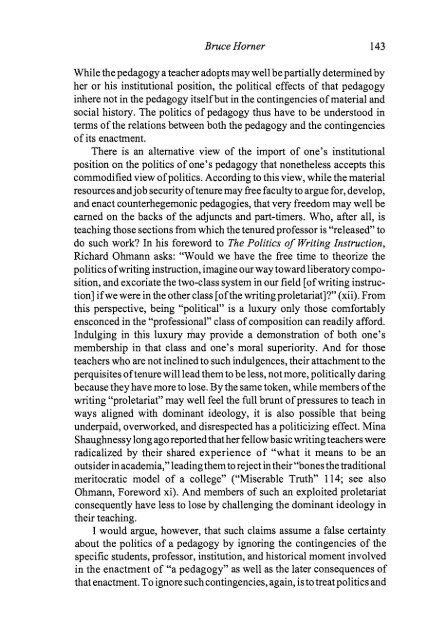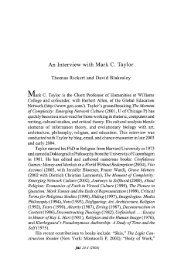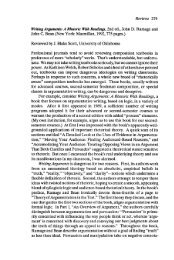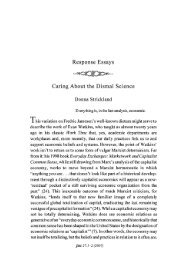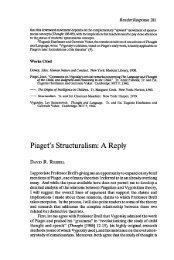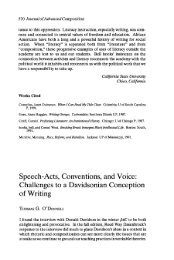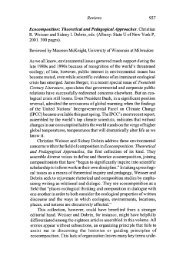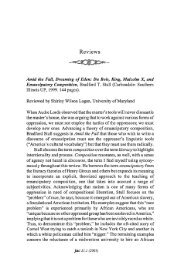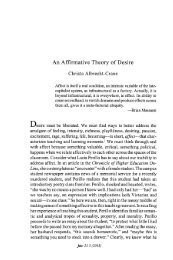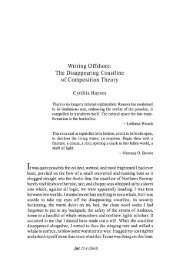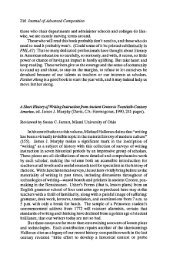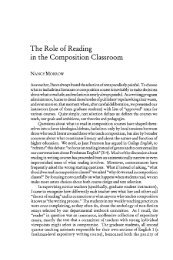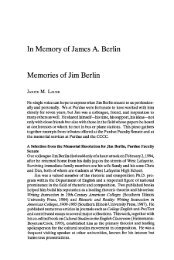Politics, Pedagogy, and the Profession of Composition ... - JAC Online
Politics, Pedagogy, and the Profession of Composition ... - JAC Online
Politics, Pedagogy, and the Profession of Composition ... - JAC Online
Create successful ePaper yourself
Turn your PDF publications into a flip-book with our unique Google optimized e-Paper software.
Bruce Horner 143<br />
While <strong>the</strong> pedagogy a teacher adopts may well be partially determined by<br />
her or his institutional position, <strong>the</strong> political effects <strong>of</strong> that pedagogy<br />
inhere not in <strong>the</strong> pedagogy itselfbut in <strong>the</strong> contingencies <strong>of</strong> material <strong>and</strong><br />
social history. The politics <strong>of</strong> pedagogy thus have to be understood in<br />
terms <strong>of</strong> <strong>the</strong> relations between both <strong>the</strong> pedagogy <strong>and</strong> <strong>the</strong> contingencies<br />
<strong>of</strong> its enactment.<br />
There is an alternative view <strong>of</strong> <strong>the</strong> import <strong>of</strong> one's institutional<br />
position on <strong>the</strong> politics <strong>of</strong> one's pedagogy that none<strong>the</strong>less accepts this<br />
commodified view <strong>of</strong> politics. According to this view, while <strong>the</strong> material<br />
resources <strong>and</strong>job security <strong>of</strong>tenure may free faculty to argue for, develop,<br />
<strong>and</strong> enact counterhegemonic pedagogies, that very freedom may well be<br />
earned on <strong>the</strong> backs <strong>of</strong> <strong>the</strong> adjuncts <strong>and</strong> part-timers. Who, after all, is<br />
teaching those sections from which <strong>the</strong> tenured pr<strong>of</strong>essor is "released" to<br />
do such work? In his foreword to The <strong>Politics</strong> <strong>of</strong> Writing Instruction,<br />
Richard Ohmann asks: "Would we have <strong>the</strong> free time to <strong>the</strong>orize <strong>the</strong><br />
politics <strong>of</strong> writing instruction, imagine our way toward liberatory composition,<br />
<strong>and</strong> excoriate <strong>the</strong> two-class system in our field [<strong>of</strong> writing instruction]<br />
if we were in <strong>the</strong> o<strong>the</strong>r class [<strong>of</strong> <strong>the</strong> writing proletariat]?" (xii). From<br />
this perspective, being "political" is a lUxury only those comfortably<br />
ensconced in <strong>the</strong> "pr<strong>of</strong>essional" class <strong>of</strong> composition can readily afford.<br />
Indulging in this luxury may provide a demonstration <strong>of</strong> both one's<br />
membership in that class <strong>and</strong> one's moral superiority. And for those<br />
teachers who are not inclined to such indulgences, <strong>the</strong>ir attachment to <strong>the</strong><br />
perquisites <strong>of</strong>tenure wi11lead <strong>the</strong>m to be less, not more, politically daring<br />
because <strong>the</strong>y have more to lose. By <strong>the</strong> same token, while members <strong>of</strong><strong>the</strong><br />
writing "proletariat" may well feel <strong>the</strong> full brunt <strong>of</strong> pressures to teach in<br />
ways aligned with dominant ideology, it is also possible that being<br />
underpaid, overworked, <strong>and</strong> disrespected has a politicizing effect. Mina<br />
Shaughnessy long ago reported that her fellow basic writing teachers were<br />
radicalized by <strong>the</strong>ir shared experience <strong>of</strong> "what it means to be an<br />
outsider in academia," leading <strong>the</strong>m to reject in <strong>the</strong>ir "bones <strong>the</strong> traditional<br />
meritocratic model <strong>of</strong> a college" ("Miserable Truth" 114; see also<br />
Ohmann, Foreword xi). And members <strong>of</strong> such an exploited proletariat<br />
consequently have less to lose by challenging <strong>the</strong> dominant ideology in<br />
<strong>the</strong>ir teaching.<br />
I would argue, however, that such claims assume a false certainty<br />
about <strong>the</strong> politics <strong>of</strong> a pedagogy by ignoring <strong>the</strong> contingencies <strong>of</strong> <strong>the</strong><br />
specific students, pr<strong>of</strong>essor, institution, <strong>and</strong> historical moment involved<br />
in <strong>the</strong> enactment <strong>of</strong> "a pedagogy" as well as <strong>the</strong> later consequences <strong>of</strong><br />
that enactment. To ignore such contingencies, again, is to treat politics <strong>and</strong>


